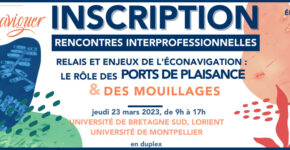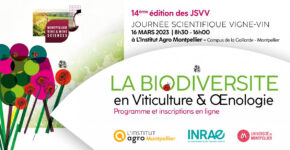
Relays & challenges of eco-navigation: the role of marinas and anchorages
Content type: Calendar

Materials for health, energy, and the environment – From molecules to materials
Content type: Calendar

How water is treated to make it drinkable
Content type: The conversation
Published on: February 14 , 2023
In France, two-thirds of the drinking water produced is collected from groundwater...

Science at UM [S02-ep15]: From chronic pain to 3D microtomography
Content type: Podcast
Published on: February 10 , 2023
This week in Science at UM, Cyril Rivat, a researcher at INM, joins us to explain...

Biodiversity in viticulture and oenology
Content type: Calendar

Lunaret BioCenter Montpellier (BIOLuM)
Content type: Page
Label: Support and Research Unit Research UAR) Main supervisory bodies: CNRS, UMP Research cluster: Biology and Health

Montpellier Institute of Data Science (ISDM)
Content type: Page
The ISDM aims to provide a reference structure for bringing together forces and actions in the field of data science and science data. The ISDM, drawing on the excellence of academic resources in data management and exploitation, aims to promote responsible data management and deploy support measures to facilitate and strengthen the use of data science. Label: Support and Research Unit Research UAR) Main supervisory body: CIRAD, INSERM, UMP Research cluster: Mathematics, Computer Science, Physics, and Systems WEBSITE

Maison des Sciences de l’Homme SUD – Science and Society United for a Different Kind of Development
Content type: Page
Label: Support and Research Unit Research UAR) Primary supervisory bodies: UPVM, CNRS, UM Secondary supervisory bodies: IRD, CIRAD Research cluster: Management WEBSITE

Early childhood: languages, multimodality, multilingualism
Content type: Calendar

Science at UM [S02-ep14]: From feelings of insecurity to the Eco meeting
Content type: Podcast
Published on: February 2 , 2023
This week on A l’UM la science, Marie-Christine Sordino, director of the law team...

“Where does quantum physics hide in our daily lives?”
Content type: Calendar

“Overview of methods for handling missing values”
Content type: Calendar

Marie Morille: the mega-strategic nanoformulation
Content type: Portrait
A researcher at the Charles Gerhardt Institute (ICGM) and lecturer in the Department of Galenic Pharmacy and Biomaterials at the University of Montpellier, Marie Morille is conducting several strategic research projects on the formulation of biotherapies. This earned her the IUF award in 2022, after winning an ANR junior award in 2020.

“The microbiota-gut-brain axis and its role in psychiatric disorders”
Content type: Calendar

Science at UM [S02-ep13]: From the resilience of teeth to hummingbirds
Content type: Podcast
Published on: January 26 , 2023
This week on A l’UM la science, Alban Desoutter and Frédéric Cuisinier from the LBN talk to us about...
